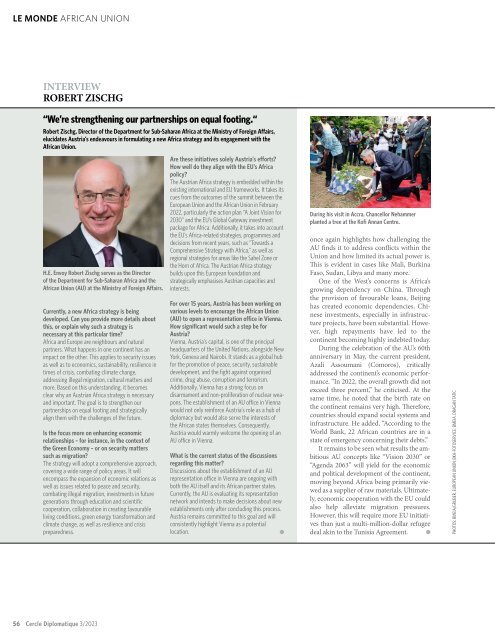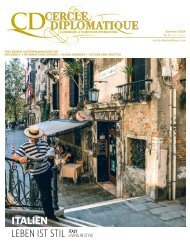CERCLE DIPLOMATIQUE - issue 03/2023
CD is an independent and impartial magazine and is the medium of communication between foreign representatives of international and UN-organisations based in Vienna and the Austrian political classes, business, culture and tourism. CD features up-to-date information about and for the diplomatic corps, international organisations, society, politics, business, tourism, fashion and culture. Furthermore CD introduces the new ambassadors in Austria and informs about designations, awards and top-events. Interviews with leading personalities, country reports from all over the world and the presentation of Austria as a host country complement the wide range oft he magazine.
CD is an independent and impartial magazine and is the medium of communication between foreign representatives of international and UN-organisations based in Vienna and the Austrian political classes, business, culture and tourism. CD features up-to-date information about and for the diplomatic corps, international organisations, society, politics, business, tourism, fashion and culture. Furthermore CD introduces the new ambassadors in Austria and informs about designations, awards and top-events. Interviews with leading personalities, country reports from all over the world and the presentation of Austria as a host country complement the wide range oft he magazine.
Create successful ePaper yourself
Turn your PDF publications into a flip-book with our unique Google optimized e-Paper software.
LE MONDE AFRICAN UNION<br />
INTERVIEW<br />
ROBERT ZISCHG<br />
“We’re strengthening our partnerships on equal footing.“<br />
Robert Zischg, Director of the Department for Sub-Saharan Africa at the Ministry of Foreign Affairs,<br />
elucidates Austria’s endeavours in formulating a new Africa strategy and its engagement with the<br />
African Union.<br />
H.E. Envoy Robert Zischg serves as the Director<br />
of the Department for Sub-Saharan Africa and the<br />
African Union (AU) at the Ministry of Foreign Affairs.<br />
Currently, a new Africa strategy is being<br />
developed. Can you provide more details about<br />
this, or explain why such a strategy is<br />
necessary at this particular time?<br />
Africa and Europe are neighbours and natural<br />
partners. What happens in one continent has an<br />
impact on the other. This applies to security <strong>issue</strong>s<br />
as well as to economics, sustainability, resilience in<br />
times of crisis, combating climate change,<br />
addressing illegal migration, cultural matters and<br />
more. Based on this understanding, it becomes<br />
clear why an Austrian Africa strategy is necessary<br />
and important. The goal is to strengthen our<br />
partnerships on equal footing and strategically<br />
align them with the challenges of the future.<br />
Is the focus more on enhancing economic<br />
relationships – for instance, in the context of<br />
the Green Economy – or on security matters<br />
such as migration?<br />
The strategy will adopt a comprehensive approach,<br />
covering a wide range of policy areas. It will<br />
encompass the expansion of economic relations as<br />
well as <strong>issue</strong>s related to peace and security,<br />
combating illegal migration, investments in future<br />
generations through education and scientific<br />
cooperation, collaboration in creating favourable<br />
living conditions, green energy transformation and<br />
climate change, as well as resilience and crisis<br />
preparedness.<br />
Are these initiatives solely Austria’s efforts?<br />
How well do they align with the EU’s Africa<br />
policy?<br />
The Austrian Africa strategy is embedded within the<br />
existing international and EU frameworks. It takes its<br />
cues from the outcomes of the summit between the<br />
European Union and the African Union in February<br />
2022, particularly the action plan “A Joint Vision for<br />
2<strong>03</strong>0” and the EU’s Global Gateway investment<br />
package for Africa. Additionally, it takes into account<br />
the EU’s Africa-related strategies, programmes and<br />
decisions from recent years, such as “Towards a<br />
Comprehensive Strategy with Africa,” as well as<br />
regional strategies for areas like the Sahel Zone or<br />
the Horn of Africa. The Austrian Africa strategy<br />
builds upon this European foundation and<br />
strategically emphasises Austrian capacities and<br />
interests.<br />
For over 15 years, Austria has been working on<br />
various levels to encourage the African Union<br />
(AU) to open a representation office in Vienna.<br />
How significant would such a step be for<br />
Austria?<br />
Vienna, Austria’s capital, is one of the principal<br />
headquarters of the United Nations, alongside New<br />
York, Geneva and Nairobi. It stands as a global hub<br />
for the promotion of peace, security, sustainable<br />
development, and the fight against organised<br />
crime, drug abuse, corruption and terrorism.<br />
Additionally, Vienna has a strong focus on<br />
disarmament and non-proliferation of nuclear weapons.<br />
The establishment of an AU office in Vienna<br />
would not only reinforce Austria’s role as a hub of<br />
diplomacy but would also serve the interests of<br />
the African states themselves. Consequently,<br />
Austria would warmly welcome the opening of an<br />
AU office in Vienna.<br />
What is the current status of the discussions<br />
regarding this matter?<br />
Discussions about the establishment of an AU<br />
representation office in Vienna are ongoing with<br />
both the AU itself and its African partner states.<br />
Currently, the AU is evaluating its representation<br />
network and intends to make decisions about new<br />
establishments only after concluding this process.<br />
Austria remains committed to this goal and will<br />
consistently highlight Vienna as a potential<br />
location.<br />
During his visit in Accra, Chancellor Nehammer<br />
planted a tree at the Kofi Annan Centre.<br />
once again highlights how challenging the<br />
AU finds it to address conflicts within the<br />
Union and how limited its actual power is.<br />
This is evident in cases like Mali, Burkina<br />
Faso, Sudan, Libya and many more.<br />
One of the West’s concerns is Africa’s<br />
growing dependency on China. Through<br />
the provision of favourable loans, Beijing<br />
has created economic dependencies. Chinese<br />
investments, especially in infrastructure<br />
projects, have been substantial. However,<br />
high repayments have led to the<br />
continent becoming highly indebted today.<br />
During the celebration of the AU’s 60th<br />
anniversary in May, the current president,<br />
Azali Assoumani (Comoros), critically<br />
addressed the continent’s economic performance.<br />
“In 2022, the overall growth did not<br />
exceed three percent,” he criticised. At the<br />
same time, he noted that the birth rate on<br />
the continent remains very high. Therefore,<br />
countries should expand social systems and<br />
infrastructure. He added, “According to the<br />
World Bank, 22 African countries are in a<br />
state of emergency concerning their debts.”<br />
It remains to be seen what results the ambitious<br />
AU concepts like “Vision 2<strong>03</strong>0” or<br />
“Agenda 2063” will yield for the economic<br />
and political development of the continent,<br />
moving beyond Africa being primarily viewed<br />
as a supplier of raw materials. Ultimately,<br />
economic cooperation with the EU could<br />
also help alleviate migration pressures.<br />
However, this will require more EU initiatives<br />
than just a multi-million-dollar refugee<br />
deal akin to the Tunisia Agreement.<br />
PHOTOS: BMEIA/GRUBER, EUROPEAN UNION; BKA-FOTOSERVICE; BMEIA, DRAGAN TATIC<br />
ENTGELTLICHE EINSCHALTUNG PHOTOS: ADA, FRANZ HELMRICH, UNHCR, JUGEND EINE<br />
WELT, AEE INTEC, WORLD BANK VINCENT TREMEAU<br />
Combating poverty, promoting peace and protecting the environment<br />
Combating poverty, promoting peace and protecting<br />
the environment: These are the three<br />
main goals of the Austrian Development Agency<br />
(ADA). Developing answers and implementing<br />
measures that are socially and environmentally<br />
sustainable, efficient, and humane require government<br />
and civil society to work together.<br />
Austria aims to promote better life prospects in<br />
an environment of social and political stability<br />
through development cooperation. The Austrian<br />
Development Agency (ADA) as the operational<br />
unit of Austrian Development Cooperation,<br />
together with numerous ministries, social partners,<br />
civil society, businesses and academia,<br />
seeks to ensure that sustainable development<br />
works to the benefit of all people in developing<br />
countries. ADA staff on the ground in 24 local<br />
offices make sure that Austria’s efforts are in<br />
line both with national development goals and<br />
the needs of the local population, and that the<br />
funds are put to the best possible use.<br />
Austria is particularly committed to meeting<br />
challenges posed by climate change, conflicts,<br />
and the repercussions of COVID-19. ADA contributes<br />
to reducing poverty through the promotion<br />
of economic and social development, ensuring<br />
peace and human security as well as protecting<br />
the environment and natural resources.<br />
Austrian know-how<br />
ADA is primarily engaged in sectors where Austria<br />
can contribute its professional know-how<br />
and long-standing experience: water supply and<br />
sanitation, renewable energy, climate protection,<br />
agriculture and forestry, private sector and<br />
development as well as human security, human<br />
rights and rule of law. In all projects and programmes,<br />
ADA attaches particular importance<br />
to the equal participation of women and takes<br />
special account of the needs of children and<br />
persons with disabilities.<br />
Global action<br />
Austrian Development Cooperation is based<br />
on trust and partnership. Funds are deployed<br />
efficiently in selected focus countries and<br />
regions. The agency’s local offices ensure partnership-based<br />
work as well as effective monitoring<br />
and controlling. The projects and programmes<br />
are tailored with our partners to the<br />
conditions in the respective countries. Austria is<br />
active in Africa, Southeast Europe, in the South<br />
Caucasus as well as in Bhutan and Palestine.<br />
Clear vision<br />
Austria’s overarching goal is to achieve ecological<br />
and social security in a world with economic<br />
stability. As a solidary part of the international<br />
community, Austria is committed to the<br />
well-being of all people, better life prospects<br />
and more social and political stability worldwide.<br />
Austria’s strategic guidelines and concrete<br />
projects and programmes are aligned with the<br />
Agenda 2<strong>03</strong>0, adopted by the International<br />
Community in 2015, with its 17 Sustainable<br />
Development Goals (SDGs).<br />
WHAT ADA DOES<br />
The Austrian Development Agency (ADA), the operational unit of Austrian Development Cooperation, supports countries in<br />
Africa, Asia, Southeast and Eastern Europe in their sustainable development. ADA cooperates with public institutions, civil<br />
society organisations, scientific institutions and companies. In 2022, ADA funded 558 projects and programmes with a volume of<br />
723 million euros. ADA staff on the ground in 24 local offices in 12 countries make sure that ADA operations are in line both with<br />
national development goals and the needs of the local population, and that the funds are put to the best possible use.<br />
You can find more information at:<br />
56 Cercle Diplomatique 3/<strong>2023</strong><br />
entwicklung.at austriandevelopmentagency @austriandev @AustrianDev
















